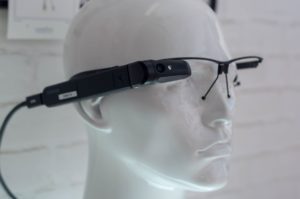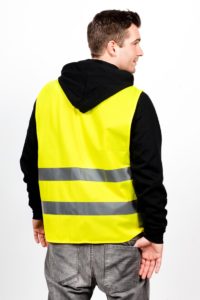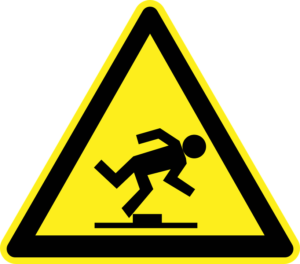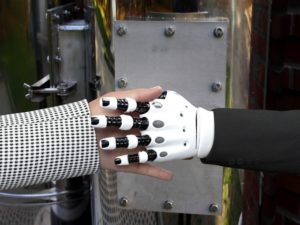Technology is moving at a very fast pace and we should be aware of the latest wearable construction innovation. Wearable innovation can save companies and contractors thousands of dollars due to enhanced safety and training to your workers.
Every year the construction industry spends more than $1 billion in fines and loss of productivity that could be avoided by using wearable construction innovation and technology.
So, the big question is, is wearable construction innovation worth it? Let’s see what options you have and let’s discuss the pros and cons of each technology.
1. Smart Helment

Photo Flickr MarcoVerch
There are a few options out there that could be the right solution for you. Wearable smart helmets are equipped with cameras and video recording options aimed at assisting your worker. The wearable helmet offers 360 -degree, HD recording, photos, blueprints and maps that will show the worker actual conditions and provide hands-free data.
However, some groups claim that because of the offerings and data being displayed, the worker tends to be distracted during the work execution increasing the risks. Not a super fan of it, because some companies will say it is the best next thing. I will recommend for you to try and decide whether it makes sense to your business or not.
2. Cooling Vest

Photo by Spreadshirt Flickr
These nice vests will allow workers to stay cool during hot weather or in very humid environments. The battery powered vests are designed to cool workers, by using a jacket or a hat to maintain the proper flow avoiding heat related injuries. The vests are OSHA compliant and can blow up to 5 gallons of air per second. The battery can last up to 24 hours when used continuously under a single charge.
3. Geo-Tagged Safety Vests
Global positioning systems will go hand in hand with geo-tagged safety vests. The vests sensors can be used to alert worker when they are entering danger areas at the construction site and can also be used in conjunction with GPS equipped heavy equipment. The vests will detect the heavy equipment on site and will slow down the equipment to prevent safety incidents.
Also, it is a great tool, when used correctly, to detect areas of zones at the jobsite where construction workers slow down because of resource constraints, safety hazards, or perhaps site conditions. The data is captured and can be used to improve productivity and determine how many resources are working at any given time in specific project areas.
Cool stuff that even when pricey, can provide many benefits and reduce your EMR rates, increasing the safety performance of the company.
4. Trip Sensors

A wearable sensor that measures slips and trips in real time provides more data for you to analyze and review determining potential unsafe areas. The sensor can also be used to alert employees if they need to vacate an area due to a safety or environmental concerns, including sudden storms.
The tracker also provides the accurate headcount if you need to gather all employees at a muster point. The benefits of this device are real and can be used to improve communication, safety and project management process.
The sensor can be used by employees to alert about unsafe practices or work areas reducing the injury incidence at your construction site.
5. Smart Glasses
Originally from Google, many vendors are now offering these products that can be seen as a VR kind of thing. The glasses are used on site facilitating the work being carried out by the worker, keeping him hand free and with the latest data on “sight” so they can troubleshoot and follow procedures easily.
Some glasses have the ability to scan bar codes and store data, while others can be used to snap photos of project site conditions. Great tool to use on site and recommended as it will expedite solutions and increase worker effectiveness.
6. Bionic Suits

The newest addition to the wearable technology, bionic suits are here to stay. The suits enhance mobility, strength and endurance for your workers. It offers help to the worker by relieving between 5-15 pounds from a worker’s arm when the springs located in the vest are activated.
The bionic suit can also hold drills, impact drivers, wrenches and sprayers.
Overall Benefits of Wearable Technology
Depending on your company size and what the uses of the wearable technologies are, you might be asking what type of benefits it will bring to you.
It all starts with safety, as many of the applications are designed to improve safety, alert workers and facilitate a worker’s stress by helping them to perform their work. The technology is also an attractive to millennials as they can see your company as a leading edge company by offering these tools. The tools can also help acquiring data and improving workers efficiency and improving site communications.
Most of the tools are safety oriented so expect to lower your EMR rates and thus the premium for work related insurances. Another important benefit relates to communication, as it provide real time data for your management team for them to make informed decisions.
—
Are you aware of these other construction and engineering tech trends? Have you tried any these, what are your thoughts? Leave us a comment below and let us know.

